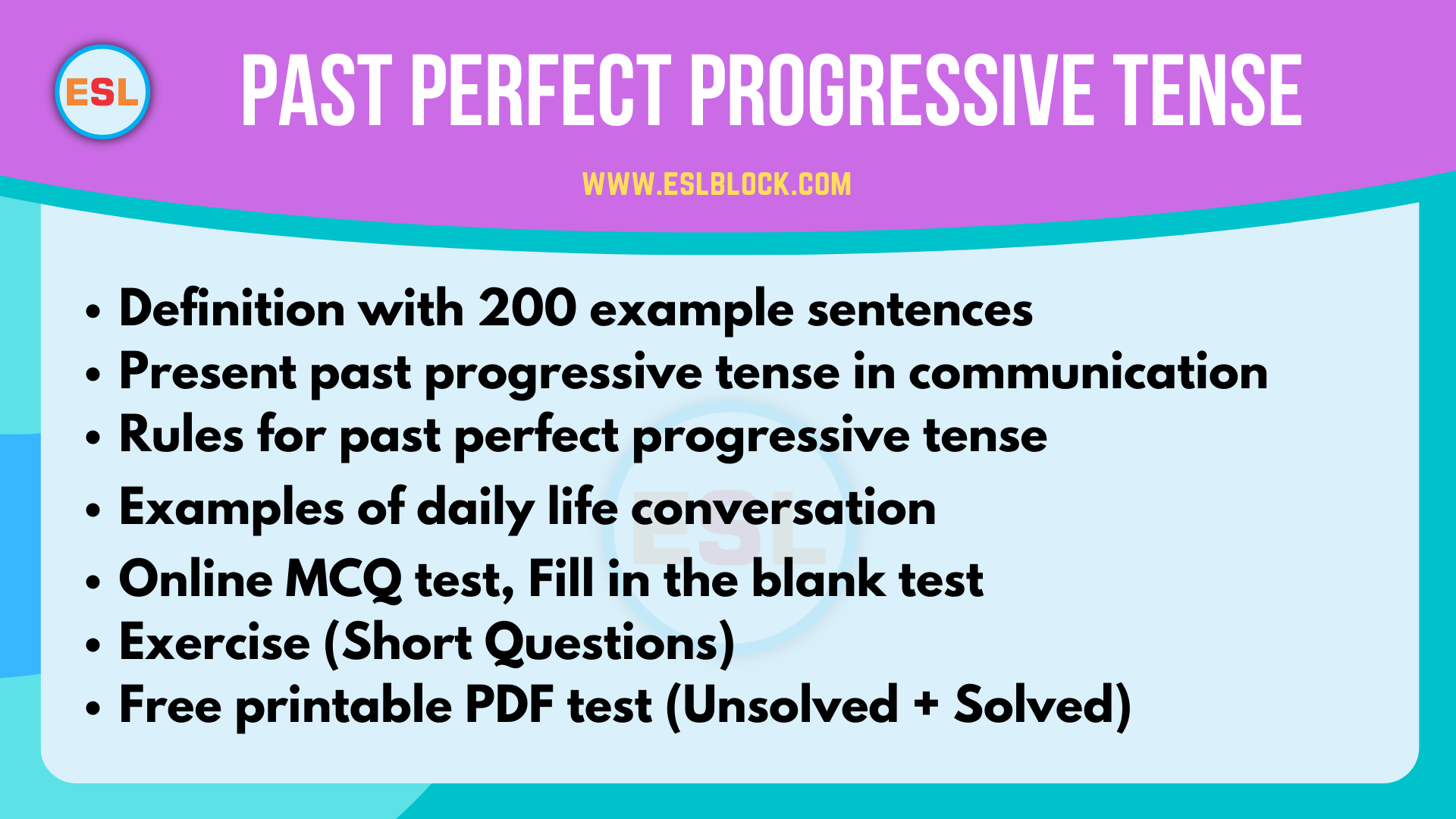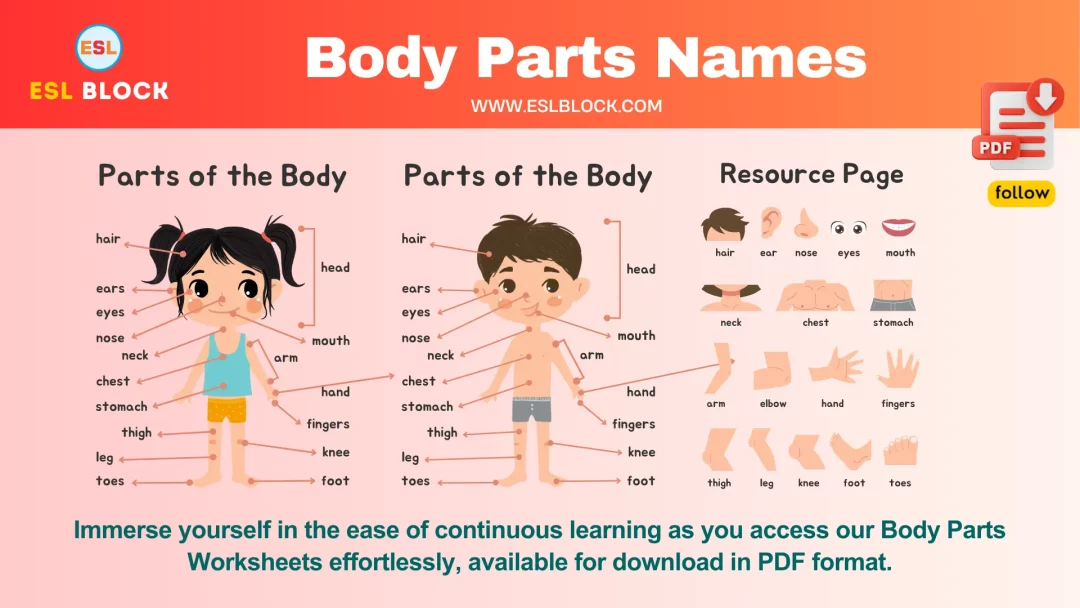Past Perfect Progressive Tense Definition With Examples

![]()
The past perfect progressive tense, also known as the past perfect continuous, is a verb tense used to describe an action that was ongoing in the past before another past action took place. It is formed by using the auxiliary verb “had” with the past participle of “been” and the present participle of the main verb.
Understanding the past perfect progressive tense is essential for being able to accurately express past actions and events in the English language. This tense can be used to describe specific timeframes and indicate a duration of time, making it an important tool for effective communication.
Read also: Personal Injury Lawyer Greenville NC
The purpose of this blog post is to provide a comprehensive overview of the past perfect progressive tense, including how to form it, when to use it, and common mistakes to avoid.
Through a combination of explanations, examples, and practice exercises, readers will gain a solid understanding of this verb tense and be able to use it confidently in their own writing and conversation.
Read also: Types of Sentences Worksheets
How to form Past Perfect Progressive Tense?
The auxiliary verb “had” is used to form the past perfect progressive tense. It is the past tense of the auxiliary verb “have” and is used to indicate that an action was ongoing in the past before another past action took place.
The past participle of the verb “been” is used in the formation of the past perfect progressive tense. It is used with the auxiliary verb “had” to indicate that the subject of the sentence has been in a particular state or condition.
- “I had been studying for the exam for three hours when my friend called.” (indicating an ongoing action of studying before the past action of receiving a call)
- “She had been working on the project for two weeks before she realized she had made a mistake.” (indicating an ongoing action of working before the past action of realizing a mistake)
- “They had been playing basketball for an hour when it started to rain.” (indicating an ongoing action of playing before the past action of it starting to rain)
Rules for affirmative sentences
To form an affirmative sentence in the past perfect progressive tense, you need to use the auxiliary verb “had” + the past participle of the verb “been” + the present participle of the main verb.
The structure of the affirmative sentence will be: Subject + had + been + present participle of the main verb.
Example sentences of affirmative past perfect progressive
- I had been studying for the exam for three hours when my friend called.
- She had been working on the project for two weeks before she realized she had made a mistake.
- They had been playing basketball for an hour when it started to rain.
- He had been waiting for her for an hour when she finally arrived.
- I had been cooking dinner for 45 minutes when the power went out.
- They had been traveling for a month before they returned home.
- She had been teaching the class for an hour before taking a break.
- He had been running for 20 minutes before he stopped to catch his breath.
- I had been reading the book for three days before I finished it.
- They had been discussing the plan for an hour before they made a decision.
Rules for negative sentences
To form a negative sentence in the past perfect progressive tense, you need to use the auxiliary verb “had” + not + the past participle of the verb “been” + the present participle of the main verb.
The structure of the negative sentence will be: Subject + had + not + been + present participle of the main verb.
Example sentences of negative past perfect progressive
- I had not been studying for the exam for three hours when my friend called.
- She had not been working on the project for two weeks before she realized she had made a mistake.
- They had not been playing basketball for an hour when it started to rain.
- He had not been waiting for her for an hour when she finally arrived.
- I had not been cooking dinner for 45 minutes when the power went out.
- They had not been traveling for a month before they returned home.
- She had not been teaching the class for an hour before taking a break.
- He had not been running for 20 minutes before he stopped to catch his breath.
- I had not been reading the book for three days before I finished it.
- They had not been discussing the plan for an hour before they made a decision.
Rules for interrogative sentences
To form an interrogative sentence in the past perfect progressive tense, you need to use the auxiliary verb “had” + the subject + the past participle of the verb “been” + the present participle of the main verb.
The structure of the interrogative sentence will be: Had + subject + been + present participle of the main verb?
Example sentences of interrogative past perfect progressive
- Had you been studying for the exam for three hours when your friend called?
- Had she been working on the project for two weeks before she realized she had made a mistake?
- Had they been playing basketball for an hour when it started to rain?
- Had he been waiting for her for an hour when she finally arrived?
- Had I been cooking dinner for 45 minutes when the power went out?
- Had they been traveling for a month before they returned home?
- Had she been teaching the class for an hour before taking a break?
- Had he been running for 20 minutes before he stopped to catch his breath?
- Had you been reading the book for three days before you finished it?
- Had they been discussing the plan for an hour before they made a decision?
Short Paragraphs for using the Past Perfect Progressive Tense
I had been walking my dog for an hour when I realized I was lost. I had been following a trail through the park, but must have taken a wrong turn somewhere. I had been trying to retrace my steps, but couldn’t seem to find my way back. I was getting worried, but eventually, I managed to find my way back to the main path and made it home safely.
She had been shopping for groceries for a while when she realized she had left her purse at home. She had been walking up and down the aisles, filling her cart with items she needed when she realized that her purse was missing. She had been trying to remember where she had left it, but couldn’t recall. She was getting frustrated, but decided to leave the groceries and go back home to get her purse.
He had been exercising at the gym for an hour when he noticed that he had left his phone at home. He had been running on the treadmill and lifting weights, when he realized that he had no way to call for a ride home. He had been trying to think of a solution, but couldn’t think of one. He was getting worried, but eventually he was able to borrow a phone from a friend and call for a ride.
They had been hiking for a couple of hours when they came across a beautiful waterfall. They had been following the trail and had been chatting, enjoying the scenery when they stumbled upon the waterfall. They had been taking pictures and admiring the view for a while before continuing on their hike.
I had been working on my presentation for the meeting for a couple of hours when I realized that I had left my flash drive at home. I had been preparing slides, collecting data, and practicing my delivery when I realized that the flash drive containing all my work was missing. I had been panicking, but eventually, I was able to find a solution and present my work from my laptop.
Examples of Past Perfect Progressive Tense in everyday situations
- Jake had been playing video games for hours when his mom called him for dinner.
- Sarah had not been studying for her test the night before, so she failed it.
- Had Emily been practicing her piano for the concert?
- I had been cooking dinner for an hour when my guests arrived.
- They had not been paying attention during the meeting, so they missed important information.
- Had Michael been working on his project before he submitted it?
- I had been walking my dog for an hour when I realized I was lost.
- She had not been feeling well, so she stayed home from school.
- Had Jake been waiting for us at the park?
- They had been planning their vacation for months and were finally on their way.
- He had not been sleeping well, so he was feeling tired.
- Had Sarah been studying for her exam the night before?
- I had been studying for the exam for weeks and felt prepared.
- They had not been following the recipe, so their cake turned out dry.
- Had Emily been practicing her French before she went to France?
- He had been working on his car for most of the day, trying to fix the engine.
- She had not been paying attention while driving, so she got lost.
- Had Michael been drinking enough water throughout the day?
- I had been shopping for groceries for a while when I realized I had left my purse at home.
- They had not been listening to the instructions, so they didn’t finish the project on time.
- Had Jake been exercising regularly before the marathon?
- He had been playing video games for hours when his mom called.
- She had not been eating enough, so she was feeling weak.
- Had Sarah been feeling well before the meeting?
- I had been working on my presentation for the meeting for a couple of hours when I realized that I had left my flash drive at home.
- They had not been following safety protocols, so they got injured.
- Had Emily been drinking enough water before the hike?
- He had been waiting for her for an hour when she finally arrived.
- She had not been saving enough money, so she couldn’t afford the trip.
- Had Michael been studying for his test before he took it?
- I had been cooking dinner for 45 minutes when the power went out.
- They had not been listening to the weather forecast, so they didn’t bring umbrellas.
- Had Jake been eating healthy before the big game?
- He had been running for 20 minutes before he stopped to catch his breath.
- She had not been taking her medication, so her condition worsened.
- Had Sarah been feeling tired before she went to bed?
- I had been reading the book for three days before I finished it.
- They had not been planning well, so they were running out of time.
- Had Emily been drinking enough water before her workout?
- He had been working on the project for two weeks before he realized he had made a mistake.
- She had not been getting enough sleep, so she was feeling groggy.
- Had Michael been feeling well before the party?
- I had been walking my dog for an hour when it started to rain.
- They had not been following the instructions, so their cake turned out dry.
- Had Jake been feeling well before he went to the doctor?
- He had been playing basketball for an hour when it started to rain.
- She had not been preparing enough for her interview, so she didn’t get the job.
- Had Sarah been feeling nervous before her presentation?
- I had been teaching the class for an hour before taking a break.
- They had not been budgeting well, so they were running out of money.
- Had Emily been feeling confident before her exam?
- He had been waiting for the bus for 15 minutes when it finally arrived.
- She had not been eating enough fruits and vegetables, so she felt weak.
- Had Michael been feeling well before the race?
- I had been studying for the exam for three hours when my friend called.
- They had not been following safety protocols, so they got injured.
- Had Jake been feeling prepared before his big game?
- He had been working on his car for most of the day, trying to fix the engine.
- She had not been paying attention while driving, so she got lost.
- Had Sarah been feeling well before her flight?
- I had been shopping for clothes for a couple of hours when I realized I had left my wallet at home.
- They had not been communicating well, so they were having problems at work.
- Had Emily been feeling excited before her concert?
- He had been playing video games for hours when his mom called him for dinner.
- She had not been studying for her test the night before, so she failed it.
- Had Michael been feeling nervous before his speech?
- I had been walking my dog for an hour when I realized I was lost.
- They had not been paying attention during the meeting, so they missed important information.
- Had Jake been feeling tired before his workout?
- He had been working on his car for most of the day, trying to fix the engine.
- She had not been feeling well, so she stayed home from school.
- Had Sarah been feeling excited before her trip?
- I had been studying for the exam for weeks and felt prepared.
- They had not been following the recipe, so their cake turned out dry.
- Had Emily been feeling confident before her audition?
- He had been waiting for her for an hour when she finally arrived.
- She had not been saving enough money, so she couldn’t afford the trip.
- Had Michael been feeling well before his interview?
- I had been cooking dinner for 45 minutes when the power went out.
- They had not been listening to the weather forecast, so they didn’t bring umbrellas.
- Had Jake been feeling well before his game?
- He had been running for 20 minutes before he stopped to catch his breath.
- She had not been taking her medication, so her condition worsened.
- Had Sarah been feeling tired before her workout?
- I had been reading the book for three days before I finished it.
- They had not been planning well, so they were running out of time.
- Had Emily been feeling well before her hike?
- He had been working on the project for two weeks before he realized he had made a mistake.
- She had not been getting enough sleep, so she was feeling groggy.
- Had Michael been feeling well before his meeting?
- I had been walking my dog for an hour when it started to rain.
- They had not been following the instructions, so their cake turned out dry.
- Had Jake been feeling well before his doctor’s appointment?
- He had been playing basketball for an hour when it started to rain.
- She had not been preparing enough for her interview, so she didn’t get the job.
- Had Sarah been feeling nervous before her job interview?
- I had been teaching the class for an hour before taking a break.
- They had not been budgeting well, so they were running out of money.
- Had Emily been feeling confident before her presentation?
- He had been waiting for the bus for 15 minutes when it finally arrived.
Use of past perfect progressive tense in daily conversation
- Charlotte: Hey Benjamin, have you been waiting long?
- Benjamin: No, I just got here. I had been walking around the block to clear my head.
- Charlotte: Oh, okay. I had been running late because I had a meeting that went over.
- Benjamin: No worries. I had been catching up on some reading while I waited.
- Charlotte: How was your day?
- Benjamin: It was good. I had been working on a project at the office, but I managed to finish it before the deadline.
- Charlotte: That’s great. I had been working on a presentation for my class and was feeling a bit stressed.
- Benjamin: How did it go?
- Charlotte: It went well. I had been practicing my delivery and it paid off. I got an A on it.
- Benjamin: That’s awesome! I had been feeling a bit under the weather so I took it easy today.
- Charlotte: Oh no, are you feeling better now?
- Benjamin: Yeah, I had been resting and taking my medicine, so I’m feeling better now.
- Charlotte: Good to hear! I had been going to the gym all week and feeling pretty energized.
- Benjamin: That’s great, I’ll have to join you sometime.
Questions and answers about past perfect progressive tense
Q: What is the past perfect progressive tense?
A: The past perfect progressive tense is used to describe an action that started in the past and was still ongoing before another past action occurred. It is formed using the auxiliary verb “had” and the past participle of the verb “been” followed by the present participle of the main verb (e.g. “had been working”).
Q: When is the past perfect progressive tense used?
A: The past perfect progressive tense is used to describe an action that was ongoing in the past before another action occurred. It is also used to indicate the duration of an action that occurred before another past action.
Q: How is the past perfect progressive tense formed?
A: The past perfect progressive tense is formed using the auxiliary verb “had” and the past participle of the verb “been” followed by the present participle of the main verb. For example, “had been working” or “had been playing”.
Q: Are there any rules for forming negative and interrogative sentences in the past perfect progressive tense?
A: Yes, to form negative sentences in the past perfect progressive tense, use the word “not” between “had” and “been” and to form interrogative sentence, place the subject after the auxiliary verb ‘had’ and use question mark at the end of the sentence.
Q: Are there any common mistakes when using the past perfect progressive tense?
A: One common mistake is using the past simple instead of the past perfect progressive when describing an action that was ongoing in the past before another action occurred. It is also common to forget to use “been” with “had” when forming this tense.
Fill in the blank questions about past perfect progressive tense
- I _____ (had been/had) studying for the exam for weeks before I took it.
- They _____ (had been/had) planning their vacation for months before they finally went.
- He _____ (had been/had) working on his car for most of the day before he fixed it.
- She _____ (had been/had) feeling unwell before she decided to stay home.
- I _____ (had been/had) cooking dinner for an hour when the power went out.
- They _____ (had been/had) discussing the plan for an hour before they made a decision.
- He _____ (had been/had) playing video games for hours when his mom called him for dinner.
- She _____ (had been/had) studying for her test the night before, so she passed it.
- I _____ (had been/had) walking my dog for an hour when I realized I was lost.
- They _____ (had been/had) paying attention during the meeting, so they missed important information.
Answer:
- I had been studying for the exam for weeks before I took it.
- They had been planning their vacation for months before they finally went.
- He had been working on his car for most of the day before he fixed it.
- She had been feeling unwell before she decided to stay home.
- I had been cooking dinner for an hour when the power went out.
- They had been discussing the plan for an hour before they made a decision.
- He had been playing video games for hours when his mom called him for dinner.
- She had been studying for her test the night before, so she passed it.
- I had been walking my dog for an hour when I realized I was lost.
- They had not been paying attention during the meeting, so they missed important information.
Conclusion
In conclusion, understanding the past perfect progressive tense is an important aspect of language learning. The past perfect progressive tense is used to describe an action that started in the past and was still ongoing before another past action occurred. It is formed using the auxiliary verb “had” and the past participle of the verb “been” followed by the present participle of the main verb.
It is important to be familiar with the rules for forming negative and interrogative sentences in the past perfect progressive tense and to avoid common mistakes when using it.
Practice using the past perfect progressive tense in different context and situations will help to improve proficiency in using it.
If you have enjoyed “past perfect progressive tense,” I would be very thankful if you’d help spread it by emailing it to your friends or sharing it on Twitter, Instagram, Pinterest, or Facebook. Thank you!
With ESLBLOCK, you will study with new ideas. If you doubt the qualities of the past perfect progressive tense, reach us through our blog’s comment section. Keep checking back! We’ll do our best to give you feedback as soon as possible. Thank you!
Related Articles
Here are some more lists for you!
- List of Fish: Types of Fish with Interesting Facts and Pictures
- List of Mollusks | Types of Mollusks with Interesting Facts
- List Of Farm Animals: Different Types of Farm Animals
- Shellfish | List of Shellfish with Interesting Facts






